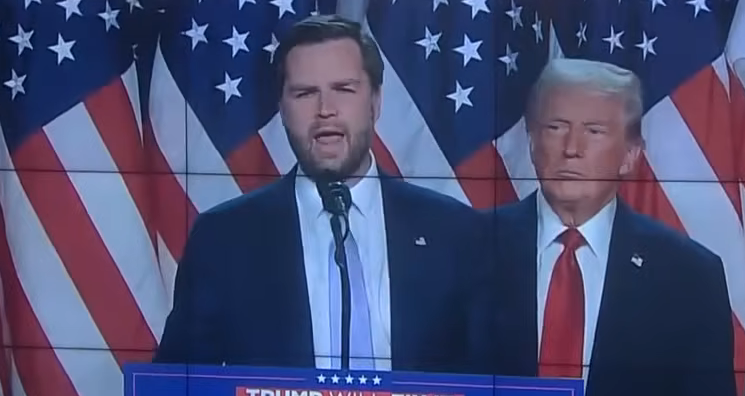By David J. Smith
Photos: YouTube Screenshots\YouTube Screenshots
I remember waking up on November 5, 1980, after casting my first vote in a presidential election to find that my candidate had been defeated in a landslide. The loss of Jimmy Carter to Ronald Reagan led to 12 years of destructive and often inhumane policies. My wife confessed that she had seriously thought of moving out of the country when Reagan was elected. I’m glad she didn’t for my sake. My father, from a working-class White community in Baltimore, couldn’t utter Reagan’s name without including the antecedent damn. Before he died, he had voted for Jesse Jackson for president.

My 20s were spent working to advance causes that aligned with my beliefs in equal opportunity, a healthy environment, and basic human rights. Having lived through Watergate, I needed reassurance in democracy and running for office was the way to achieve that. I ran for the state legislature and had my campaign materials printed on recycled paper and held a newspaper drive fundraiser but lost miserably.
This year’s loss seems a bit like the movie Groundhog Day. In 2016, we didn’t know exactly what to expect in Trump: we knew it wouldn’t be good, but maybe it wouldn’t be that bad. The previews for “Trump: The Sequel” have been out for a while and it looks dreadful.
It is not futile to resist. But to be effective it must be planned and executed well with clear objectives in mind. In January 2017 it was about resisting Trump, whatever that meant. Come January 2025, we will have a clearer idea of exactly what to resist.
At the Harris rally in DC before the election I was given a button that said, “Old White Dudes for Harris and Freedom.” Post-mortem election analysis will reveal if White dudes failed her or made a difference in some ways. But I appreciated that those of us of a certain age and color had something to offer.
I’m a part-time college professor at a school named for the man who helped form my political identity. I met with my students right after the election, and rather than staying on the syllabus offered a space where students could share how they were feeling. I recognized that not all students would want to share (and some might have been elated at the results) and allowed them the chance to leave. Our class is virtual, so I’m teaching students from across the U.S. and the world. I recognize that some of my students might be isolated from a supportive community right now. This is both the weakness and strength of the virtual teaching world: we can’t connect face to face and offer an embrace or pat of the back, but we are able to show how no matter where we are, our fears and hopes are shared.

My students, mostly in their mid 20s were teenagers when Trump was first elected. They lived through those years possibly with parents who transferred to them their own anxiety. We are now ending a rather uninspired four years of Biden. I am the first to recognize his accomplishments, but it was hard to get excited about his presidency. There was much that left Millennials and Gen Zers frustrated and increasingly resentful. Gaza was the breaking point for many. In my class, there was a range of feelings and needs. Some felt a call to action: they were ready to take it to the streets. But other students were anxious, fearful, and sad. We did offer a virtual hug. (And I reminded them to seek professional help should they feel despondent). Some of my students are from the Queer community; others Latinx, Black, and Arab; and others face legal and other challenges.
There is a role for resistance, but also a place for reassurance. I recommend the latter right now. As an old White dude who lived through Reagan, I can assure them that they will get through it all. Getting through it is less about the challenges ahead, and more about the resilience we can muster.
I can remind students that they will organize and resist when the time is right. For now, , I can offer comfort, show empathy, and assure them about the future. This is not Pollyanna but evokes our collective stories and history to show what can be accomplished. It was after Reagan that the Queer community could marry, the Americans with Disabilities Act was passed, and a man and a women of color ran for president (with one being elected).
Immediate action might be essential for some causes, but that must be done after one has reflected, taken stock of their abilities, found others they can work together with, and determined their goals. In the meantime, taking measures to reassure and recover are important. I told my students it is fine to check out right now: no news, no social media; take walks in the woods. I’ve unsubscribed to some news services and my wife is engaged in sewing therapy.
Students were anxious about the Thanksgiving Holiday and meeting with family they might not have seen eye to eye on in the past. There is no requirement to join family I reminded them: bring your own friends together to seek community right now.But if you must join family, do what you can to limit the conversation on issues that are difficult. It might not be a time for changing minds and hearts. Rather you need to be reassured about the future, take stock in your strengths, and find your resilience. You will resist another day.

David J. Smith is an adjunct professor at the Jimmy and Rosalynn Carter for Peace and Conflict Resolution at George Mason University. He resides in Rockville, Maryland.







